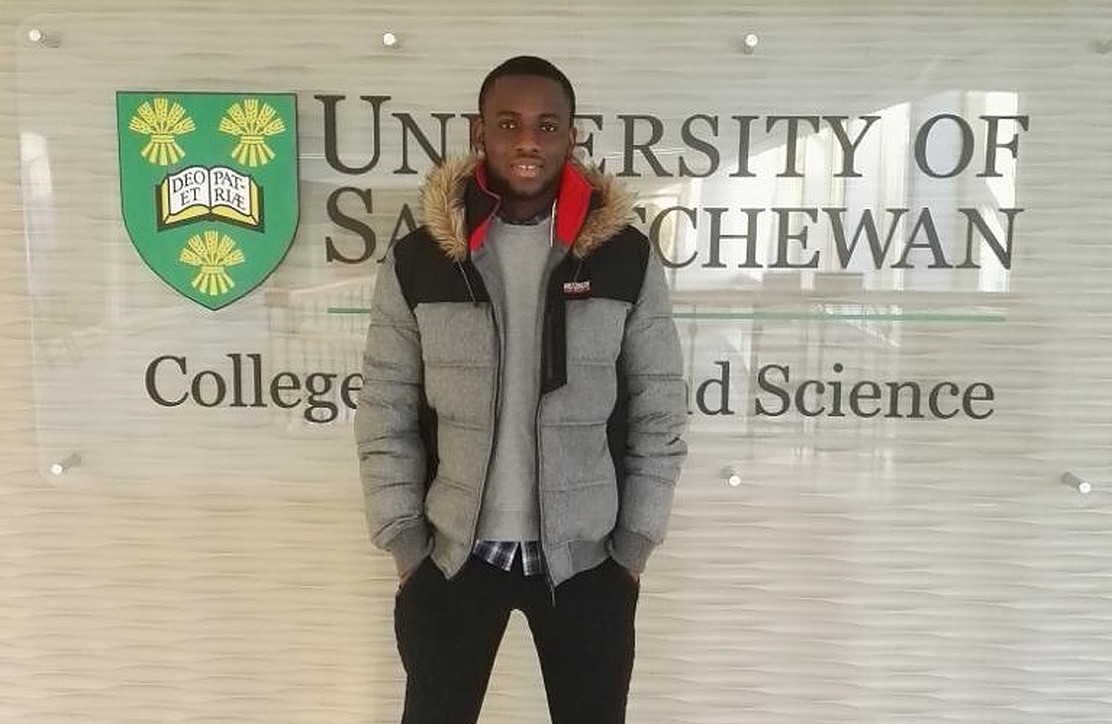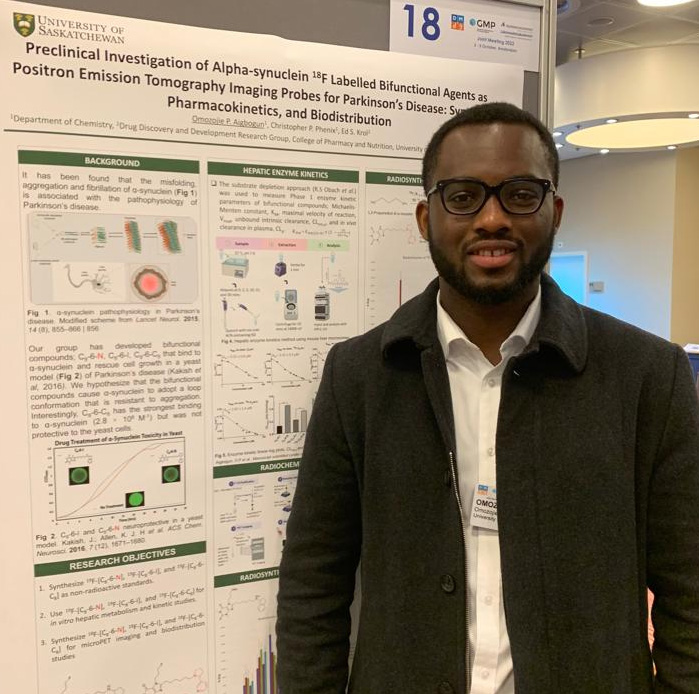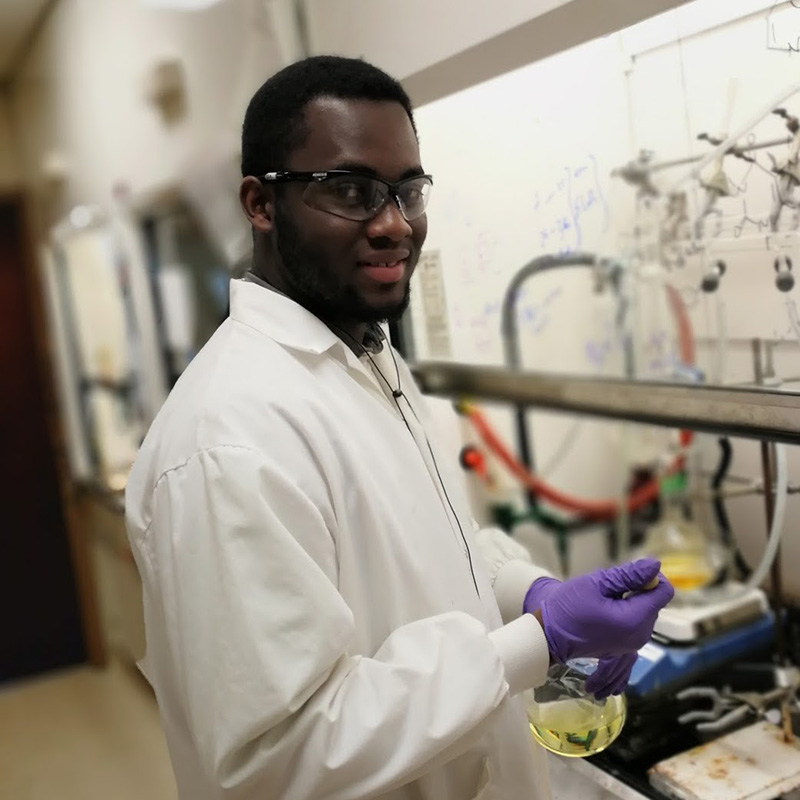
From overseas to a PhD: Aigbogun found a home at USask
Six years ago, Omozojie Paul Aigbogun found his future 11,000 kilometres away from home.
By James ShewagaIn 2017, Aigbogun boarded a flight and followed in the footsteps of fellow Nigerian international students to travel overseas to begin the most exciting step in his academic journey at the University of Saskatchewan (USask). This month, he will celebrate the decision that changed his life, as he crosses the stage at Merlis Belsher Place in front of family and friends at USask Spring Convocation to officially mark the completion of his PhD in chemistry.
“I am very proud of this accomplishment,” said Aigbogun, who will share the moment with his wife and one-month-old son, his parents in from Nigeria, and family members from Ontario. “As a first-generation immigrant and second-generation college student, getting a PhD in chemistry at the University of Saskatchewan is a symbol of what we can achieve with hard work and determination . . . When I walk the stage June 6, I am walking the stage on behalf of my PhD supervisors, my wife, my son, my parents, my family, my friends, the Department of Chemistry faculty and staff, the drug discovery and development research group, the College of Pharmacy and Nutrition staff, the Saskatchewan Centre for Cyclotron Sciences staff, and every single person who has supported me.”

For Aigbogun, family has always been the motivation and foundation of his success, from his wife Peace Ariajegbe Aigbogun to his parents—father Eromonsele and mother Cordelia—who impressed upon him the importance of dedication to education.
“They were very important in my journey to achieve my academic goals and dreams,” he said. “I would not be here today without the support of my parents. They sacrificed everything so we could get the best education in Nigeria. My mother always gave us a quote from Robert Schuller: ‘Tough times never last but tough people do.’ My mother is a teacher, so she believes so much in education as a way to liberate ourselves of mental and financial poverty. And my wife, Peace Ariajegbe Aigbogun was very important. Getting a PhD in chemistry is no easy feat, and she was my support system throughout the program.”
While completing his bachelor’s degree in chemistry in Nigeria, Aigbogun developed a fascination for the application of radiopharmaceuticals in cancer and neurodegenerative diseases, and began researching universities to continue his work. He quickly found that USask provided the perfect pairing of programs and facilities.
“I was drawn to the University of Saskatchewan when I found out about the Sylvia Fedoruk Centre for Nuclear Innovation established for development of radiopharmaceuticals, and I was drawn to the Krol/Phenix research group (led by Dr. Chris Phenix (PhD) of the College of Arts and Science and Dr. Ed Krol (PhD) in Pharmacy and Nutrition), when I read about their ongoing research on developing probes for Parkinson’s disease and cancer. I had also read about other Nigerians such as Dr. Rita Orji (PhD) who had found the University of Saskatchewan home and had so much success doing research here. At that point, choosing University of Saskatchewan was a no-brainer for me.”
To be sure, there were adjustments to the culture, cuisine, and climate when he first came to Canada, but Aigbogun quickly adapted to his new surroundings.
“The biggest change for me was the weather. I went from living in plus 30°C to minus 30°C,” he said. “So, the first year was a bit tough, however I quickly learned to wear my thermal wears and layer up before stepping out. And I appreciate the summer and sunlight more than ever and I always look forward to the walks during the summers.”
Aigbogun also found himself at home working alongside USask’s world-class researchers dedicated to improving early diagnosis and treatment for debilitating diseases like Parkinson’s.
“The world is facing an epidemic of neurodegenerative diseases,” Aigbogun said. “There is a large socioeconomic burden associated with these diseases. I believe we can harness the power of the atomic nucleus to make radioisotopes relevant for treating and diagnosing neurodegenerative diseases . . . We have made tremendous scientific progress towards finding a treatment and diagnosis for Parkinson’s through radiopharmaceuticals.”

One of the highlights of his time at USask came last year when Aigbogun received the Dr. Gerhard Herzberg International Conference Award, named in honour of the former USask researcher and 1971 Nobel Laureate in Chemistry. Aigbogun travelled to Amsterdam in October to present USask research on developing positron emission tomography probes for Parkinson’s.
Outside of research circles, Aigbogun found fellowship with fellow students in groups like the USask Nigerian Students Association, as well as basketball buddies and fellow Huskie fans.
“I have had so many positive experiences with my time on campus and I have enjoyed being involved with many of the USask campus clubs,” he said. “I have also enjoyed working as a teaching assistant for undergraduate chemistry and pharmacy courses. During stressful times, I turned to the PAC gym as a place to de-stress. I go there for workouts, pick-up basketball games, and to watch the Huskies. I would say the PAC has a special place in my heart.”
The next step in his career will take Aigbogun to Toronto this summer to begin a post-doctoral fellowship at the Centre for Addiction and Mental Health Brain Health Imaging Centre, to develop radiopharmaceuticals for imaging neurodegenerative diseases in clinical studies.
But Aigbogun will always look back on USask as the place where it all began.
“Ten years ago, I was just falling in love with radiochemistry, but with no access to a cyclotron to produce radioisotopes in Nigeria, I did not think that I would be here today at University of Saskatchewan as a PhD,” he said. “I will always be grateful to the University of Saskatchewan for giving me the opportunity to pursue my dreams and to my professors Dr. Ed Krol and Dr. Chris Phenix for believing in me.”
Together we will support and inspire students to succeed. We invite you to join by supporting current and future students' needs at USask.

